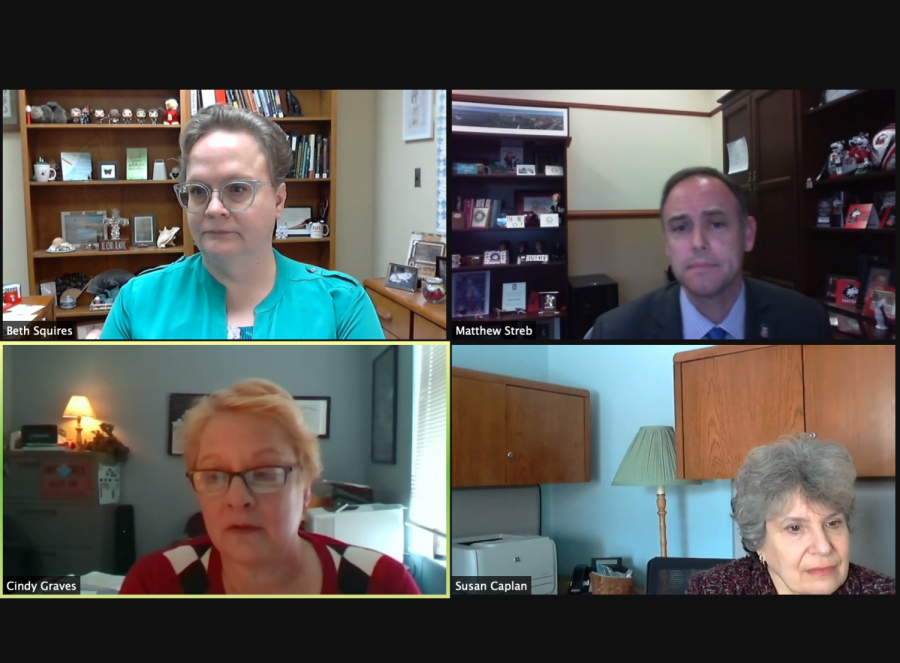University, health department answer COVID-19 vaccine questions
Panelists at Tuesday’s “COVID-19 Vaccines: Ask the Experts” event.
February 24, 2021
DeKALB – NIU staff members and the DeKalb County Health Department hosted a Q&A session Wednesday via Zoom to answer questions and discuss concerns regarding Pfizer, Moderna and Johnson & Johnson COVID-19 vaccines.
The panelists included Beth Squires, public health program coordinator for the College of Health and Human Sciences, Cindy Graves, director of community health & prevention and health promotion and emergency preparedness for the DeKalb County Health Department and Susan Caplan, chair and associate professor in NIU’s School of Nursing.
Chief of Staff Matt Streb led the discussion by asking the panelists specific questions regarding the vaccine and possible side effects of the vaccine. The session ended by answering questions asked by attendees via the Q&A feature on Zoom.
NIU does not have the right to receive vaccines and they cannot legally require students or staff to receive one since the vaccines are under an Emergency Use Authorization, Streb said.
The Pfizer mRNA vaccine and the Moderna mRNA vaccine are the two that are approved by the U.S Food and Drug Administration and Centers for Disease Control and Prevention. The Johnson & Johnson vaccine is still being tested at this time, Squires said.
The Pfizer vaccine is suitable for individuals 16 years of age or older and requires two shots given 21 days apart. The Moderna vaccine is suitable for individuals 18 years of age or older and requires two shots given 28 days apart, according to a provided presentation by Squires.
The first dose of the Pfizer shot is only 52% effective. It’s not until two weeks after the second dose it becomes 95% effective as most of us have read, Caplan said.
Two doses of the Moderna shot are 94.1% effective, according to the CDC.
“I think that you have to be very careful in terms of not getting too hung up on that percentage because you have to remember that the Pfizer and the Moderna’s efficacy rates of those two were projected and were determined,” Squires said. “We didn’t have the variance out at that point.”
Vaccine distribution was pushed out so quickly because the pandemic created a sense of urgency and allowed for extra funding, Squires said.
“mRNA vaccine is using this new technology that has been researched for years and shown to be effective, and so now this was a perfect time for us to use this new advanced technology to get the vaccine out to us sooner so we can reduce the effects of COVID-19 sooner in the population,” Squires said.
When it comes to the effects caused by the vaccine, Caplan asked if someone would rather deal with the long-term known effects caused by the COVID-19 virus or the possible effects caused by the vaccine. Caplan said it is too early to detect any actual long-term side effects caused by the vaccine.
When Squires received her vaccine, she was under strict watch by the CDC to measure how her body reacted to the vaccine. She would report her symptoms and if they were affecting her ability to work. Squires said the only side effect she faced was it made her sleep all weekend.
One audience member was concerned about sending their child back to school.
“The best thing that we can do for the kids, at least until it’s been approved for children for that age, is to vaccinate the teachers and all of the adults that are around them,” Graves said. “That is the best thing that we can do as far as protecting them once when they’re in school.”
To increase herd immunity, 70 to 80% of the population will need to be vaccinated, Caplan said.
The vaccine is most likely safe for people who are pregnant, Squires added.
“And additionally, some of your COVID immunity from the vaccine may be transferred to the baby through the breast milk, so there may be benefits to being vaccinated and breastfeeding,” Caplan said.
DeKalb County’s Health Department has around 30,000 people on their waitlist to receive the vaccine, and that’s with handing out 1,000 to 1,200 vaccines a week.
“I just wanted to let everyone know if you have a particular question about your geographical area of your county,” Caplan said. “You should go on the Illinois Department of Public Health website for COVID-19 vaccines, and you can look up the distribution of vaccines within your own county within the state where you can get vaccinated, so there’s a whole bunch of useful information there.”
Squires wants to remind people to follow the 3 W’s: wear a mask, wash your hands and watch your distance.







